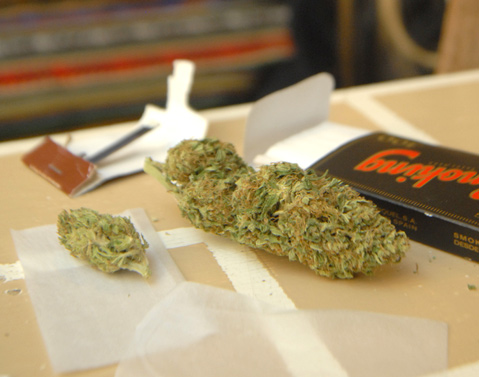City Considers 20 Percent Tax on Medical, Recreational Marijuana
Council Votes in Favor of Creating a November Ballot Item

At the same time California votes whether to legalize recreational marijuana — which, new polls show, is a distinct possibility — Santa Barbara residents will decide whether to slap a 20 percent tax on recreational and medical cannabis sold within the city. The City Council decided unanimously this Tuesday to include the Santa Barbara Marijuana Control Act on this November’s ballot that would require a simple majority to pass and annually generate an estimated $1.1 million-$2.2 million for the General Fund. “The purpose of the tax is expressly to generate revenue,” City Attorney Ariel Calonne said. “This is not a regulatory measure.”
City staff studied marijuana taxation systems in other California communities to come up with Santa Barbara’s model and determine how much money is likely to flow to the General Fund, which pays for basic services like police enforcement, road repair, and so on. The dollar amount may in reality be higher or lower, and the council may revisit the tax percentage down the road, Calonne said. “There is no magic to these numbers.” Looking around the rest of the state, 20 percent is on the high end — Sacramento taxes its dispensaries 4 percent; Oakland 5 percent; Santa Cruz 7 percent; and San Jose 10 percent. Santa Barbara’s would necessarily be steeper, councilmembers argued, in order to pay for the enforcement and monitoring costs it shoulders as the only city on the South Coast to allow medical marijuana dispensaries.
Councilmember Frank Hotchkiss worried the rate might be too high and drive sales underground. Calonne said the quality-control assurances that come with a legal, taxed product would likely counteract a bigger black market. Calonne also stated that increased costs would eat into sellers’ bottom lines, not be passed on to consumers in the form of higher purchase prices. Councilmember Randy Rowse successfully lobbied for a flat 20 percent figure, as opposed to city staff’s original recommendation of a lower 10 percent rate for medical marijuana. He said a staggered system would incentivize business owners to sell medical cannabis to avoid the more expensive rate. “We did stick our finger in the light socket,” Rowse said of allowing medical marijuana in Santa Barbara, whose treatment benefits, he claimed, were dubious at best.
If passed, California’s Adult Use of Marijuana Act would allow residents 21 and older to possess, transport, and use up to an ounce of marijuana for recreational purposes. The law would also impose cultivation taxes and a 15 percent excise tax. Last year, the state passed the Medical Marijuana Regulation and Safety Act, which set a March 1, 2016, deadline for local jurisdictions to create cultivation laws. Rushed by the clock, the City of Santa Barbara quickly approved an ordinance that permits qualified patients to grow 100 contiguous square feet of marijuana indoors or outdoors for personal medical use.



